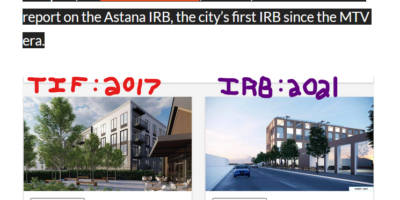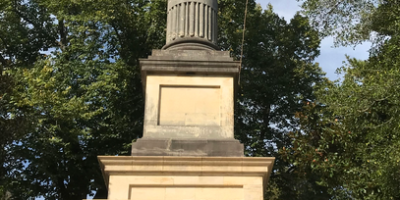A response to “Mall of God”
By Jake Caldwell
I am writing in response to the recent article in North of Center, “Mall of God.” I first want to tell you how much I have appreciated the work that you and your volunteer staff have poured into North of Center. I believe it is a much needed service to the Lexington community and the articles have been consistently well written and critically incisive.
Before I offer my response to “Mall of God,” however, a disclosure of my self-interests is in order. I am a minister on the staff of Central Christian Church, the congregation that Andrew Battista criticizes for acquiring property from the Windstream Corporation at below market value. Like almost all of the ministers I know, my work routinely positions me to see the shortcomings of my own congregation, which is to say that I do not, as a minister, labor under any pretensions about the church being above or immune from criticism. And like most ministers I know in mainline Protestant traditions, I agree whole heartedly with the issues Andrew raises with the way mega church strategy and polity parrots consumer trends.
I would, however, like to offer a theological critique of Andrew’s broader point about the problems inherent in according privileged status to religious organizations. It would be disingenuous for me or anyone else to feign impartiality on this question. After all, one’s level comfort with the privileged status of any organization will inevitably be colored by the value one places on the purpose and work of that organization—a bias that is sharpened when dealing with faith and religion which dabble in such foundational matters as one’s identity and purpose in the world. Thus it should be no wonder that religion sometimes dictates political discourse in ways that can be constructive, but so often has been detrimental to the progress and wellbeing of our society. Yet it would be naïve to imagine that the reverse is not also true—that political discourse sometimes exerts a controlling influence in matters of faith and religion. This tension is fundamentally a struggle over who gets the privilege of narrating events and circumstances in the public sphere as they really are.
In “Mall of God,” Andrew correctly identifies a tension in Christian thought between the Kingdom of God and earthly kingdoms. This tension should emerge as Christians utilize their understanding of the character and concerns of God to measure and narrate their vision of the way things really are. By so doing, Christians position themselves within the narrative of God’s reign over against competing narratives shaped by other concerns.
In this case, the competing narrative is that measured by the concerns of Lexington’s ruling elite, which I will call Lexington’s royal narrative. Andrew’s critique of Southland Christian and Central Christian, as I understand it, is that by taking advantage of their tax-exempt status to acquire property, they have entered into a relationship with the government that compromises their ability to embody the tension between the Kingdom of God and Caesar’s Rome, or, to set it in local context, Newberry’s Lexington. Thus they have corrupted their position in the narrative of God’s reign by playing an incongruent role in Lexington’s royal narrative in which key players are concerned to maintain the status quo and nurture institutions that do likewise. Andrew attempts to position himself and his concerns within the narrative of God’s reign to critique the actions of the churches and the government, which he believes have colluded in ways that reflect the concerns of Lexington’s royal narrative.
The problem with “Mall of God” is that it claims to critique Lexington’s royal narrative from within the narrative of God’s reign, yet, in several key respects, merely capitulates to the royal narrative. For example, to place a value on a property like the Lexington Mall and on the things for which it will be used on the basis of their potential to generate tax revenue is to locate oneself uniquely within the royal narrative. That doesn’t mean that as a Christian I can’t pay taxes. But it does mean that before I take up the cause of the local tax deficit, I must also ask questions like these: Will the revenue be used to assist Lexington’s homeless and marginally housed population? Or will it be used to create a more aesthetically impressive experience for wealthy patrons who will come to Lexington for horse games? If, in Lexington’s royal narrative, the latter is the prominent concern, then one whose interests are framed by the narrative of God’s reign will not lament lost tax revenue irrespective of any budget situation.
It is certainly true that in Christian theology the reign of God makes significant claims about economic justice even if American churches in general and American evangelicalism in particular have failed to grasp the implications. In the story of God and of God’s reign, true justice becomes a possibility only where God is truly worshipped—where the children of God gather to offer words of prayer and praise. The call for justice is fundamentally a confessional claim and is thus rooted firmly in the church’s central act—the worship of God. Whether that worship is led by guitars and drums in an auditorium (i.e., evangelical mega churches like Southland Christian) or organs and choirs in a sanctuary (i.e., mainline liberal Protestant churches like Central Christian), the worship of a faith community becomes the spiritual, intellectual, and, yes, even the physical hub from which the community lives into its identity and purpose.
This has been particularly true for the congregation of Central Christian who, several times in recent years, has reaffirmed our commitment to stay downtown, utilizing our physical space to serve the community as a natural extension of our worship. To forsake this vital connection is to operate in a symbolic universe other than the one established in story of God and of God’s reign.
While it is yet to be seen how Southland Christian will utilize their newly acquired space, the parallel drawn between that and Central Christian’s acquisition of the Windstream property is telling of the narrative confusion that plagues “Mall of God.” The critique is that the Windstream transaction ultimately resulted in a loss of tax revenue for the city and that it is an example of how the government subsidizes the expansion of “Christian empires” that exist to make money. I have already stated why the valuation of the acquisition and use of a property based on its potential to generate tax revenue is an accommodation to the royal narrative.
But the ironic misjudgment of Andrew’s critique is revealed in full when we consider that Central’s Windstream property is used almost exclusively for two purposes: hosting Alcoholics Anonymous meetings and housing men who are homeless during the colder half of the year—the latter being a group to whom Lexington’s royal narrative offers little hope. Both of these worthwhile services to the community come at a significant financial loss to the church. Neither activity befits the straw man Andrew has created—the sinister, capital mongering, empire colluding church. And, if one is truly working within the framework of values established in the narrative of God’s reign, neither of them could be judged less valuable than whatever taxes would have been remitted to the city if the land had been purchased by a for profit operation.
“Mall of God” offers a sensible analysis and critique of mega church culture, but not from its claimed perspective of the reign of God. The operative canon for the article is not the New Testament or the reign of God, but rather an understanding of church and state born of modern secular principles that happen to be dressed up in theological language. As sympathetic as I am to the concerns the article raises about the “socially-regressive” principles and consumerism peddled as gospel by many mega churches, from my perspective as a minister of the gospel of Jesus Christ, it is equally important to be attentive to how we tell and embody the narrative of God’s reign. To tell it in such a way as to accommodate one’s particular political sensibilities is a common practice in the religious-political discourse of our time, and perhaps it always has been. But that’s why it’s so important to make sure we have our stories straight before wielding them as hollow rhetorical devices in the public sphere.
In last issue’s story, “Mall of God,” Andrew Battista incorrectly asserted that Southland Christian has bookstores, coffee shops and apparel outlets on site. The church does offer coffee both for a price and for free, but it does not house a bookstore nor any apparel outlets.




Leave a Reply